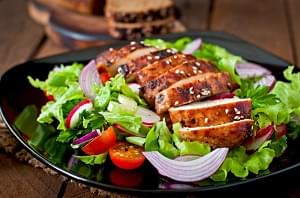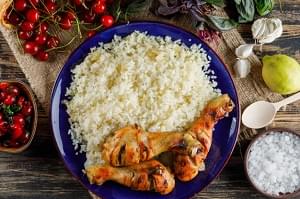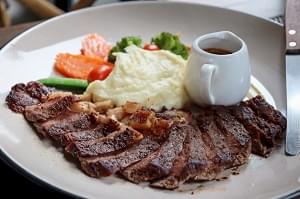The Science Of Building Muscle Part 6: Eating For Muscle Growth
The Science Of Building Muscle Part 6: Eating For Muscle Growth
Eating For Muscle Growth
(Click on Nutritional Terms and Reference Numbers in Blue for More Info)
In addition to a well-designed resistance training programme, the key to building muscle mass is a good diet. This must provide the requisite levels of nutrients and energy to fuel your workouts, support muscle protein synthesis and keep you healthy. So, in this article we are going to explain the types and quantities of food you will need to consume to achieve this.
Planning Your Diet
There is a common misconception that bodybuilders live on a high protein diet devoid of carbohydrates. While it is true that they consume higher levels of protein and may reduce their carbohydrate intake prior to competition to reduce their levels of body fat, they typically consume a balanced diet containing the various food groups. For example, the diet of 8-time Mr Olympia winner Ronnie Coleman typically contained chicken, lean beef, eggs, potatoes, beans, rice, and vegetables.
If you not sure what a well-balanced diet consists of, check out our article ‘What should we be eating’
Although the diets of top bodybuilders may contain ‘normal’ foods, the quantities and ratios of the various nutrients and the amount of energy they consume can be quite different.

Adjusting Your ‘Macros’
Bodybuilders often talk about their ‘macros’. This is short for macronutrients, the term used to describe the three major nutrients, i.e., protein, carbohydrate and fat. You will need to consume these in the right amounts, if you are to optimise your gains in muscle mass.
For example, according to internet sources, Ronnie Coleman consumed approximately 540g of protein, 474g of carbohydrates and 150g of fats daily at bodyweight of 140 kg (300 pounds).
To make things easy for you, we have provided the table below. Simply, find your body weight in the top row and the table will indicate how much protein, carbohydrate and fat you should be consuming on a daily basis. This is a good starting point, but it may take a little trial and error to figure out what works best for you.
| Bodyweight kg | 60 | 70 | 80 | 90 | 100 | 110 | 120 | 130 |
|---|---|---|---|---|---|---|---|---|
| Protein 3g/kg (1,2) | 180 | 210 | 240 | 270 | 300 | 330 | 360 | 390 |
| Carbohydrate | 240 | 280 | 320 | 360 | 400 | 440 | 480 | 520 |
| 4-7g/kg (3) | 420 | 490 | 560 | 630 | 700 | 770 | 840 | 910 |
| Fat 20% (2) | 57g | 66g | 76g | 85g | 94g | 104g | 113g | 123g |
| Calories (kcal) | 2250 | 2975 | 3400 | 3825 | 4250 | 4675 | 5100 | 5525 |
* Calories based on average
Links for table above (1) (2) and (3).
Energy Requirements

Building muscle not only requires the consumption of the right amounts and ratios of the macronutrients, but also an increase in daily energy intake to create a surplus above normal daily energy needs. This is because the daily energy cost of just maintaining our existing muscle accounts for approximately 20% of our energy intake. Building new muscle then further increases our energy needs.
While research has provided a good insight into how much protein we need to maximise muscle gains, the specific increase in energy required to build muscle has been less well understood.
However, Slater et al., (4) recently reviewed the current literature on the subject and recommend that we should start conservatively with an energy surplus within the range of ~1,500–2,000 kJ·day−1 (358 kcal – 478 kcal per day) and closely monitor our response, using changes in body composition to determine what, if any, adjustments we might need to make.
Table 1 provides an estimate of an individual’s energy needs based on bodyweight which you can use as a guide to get you started. As with the macronutrients, this provides a good starting point, but it may still take a little trial and error to figure out what works best for you.
How And When To Eat
Not only is what you eat important, but also when you eat it. As you can probably imagine, it would be difficult to consume, digest and metabolise 5000kcal of food in the three standard meals per day typically eaten by the general public. Consequently, bodybuilders will tend to break their food intake into 5 or 6 healthy balanced meals consumed throughout the day, approximately 3-4 hours apart.
This practice concurs with the guidance provided by the International Society of Sports Nutritionists (ISSN) (5), which states that 20–40 g of (0.25–0.40 g/kg body mass/dose) high-quality protein should be consumed every three to four hours to optimise muscle protein synthesis (MPS). High quality protein should also be ingested immediately to 2 hours post exercise.
Remember that it’s not just about protein: The ISSN (5) suggest that consuming carbohydrate solely or in combination with protein during resistance exercise increases muscle glycogen stores, reduces muscle damage, and facilitates greater adaptations to training.
You may be wondering what would a typical body building meal looks like.
Well, here a couple examples of the type of meals Ronnie Coleman consumed when in training.
Meal A: 8 Ounces (227g) steak, mashed potatoes, corn and steamed vegetables
Meal B: 8 Ounces (227g) BBQ seasoned chicken breast, 2 cups yellow rice and steamed vegetables
As we can see, there is nothing magical about them; they are essentially healthy, balanced meals.

Eating For Muscle Growth – Do I Need Supplements?
In theory, you should be able to obtain all of the nutrients and energy you require from your diet. However, this can be difficult if you don’t have a big appetite or if the preparation and consumption 5 or 6 meals is inconvenient for you. Even top professional bodybuilders whose lifestyles revolve around eating and training often struggle to get all of the required nutrients from food, despite the huge amount they consume. Therefore, they will often use supplements to complement their food intake. Protein shakes are perhaps the most commonly used supplement, as they provide a quick and easy way of consuming a valuable dose of high-quality protein. We’ll look at the use of supplements in greater detail in the next article in this series
Eating For Muscle Growth – Summary
As the old saying goes: “To get big, you’ve got to eat big”. This means consuming the right amounts and ratios of the macronutrients and sufficient additional calories to enable you to train and grow. You should always try to eat clean, i.e., eat whole foods whenever possible, avoid processed foods and refined sugars, and drink plenty of water. If you follow this advice, train hard and get enough sleep, you’re sure to start to pack on some muscle.
In Part 7 of this series we’re going to look at what the science says about the use of supplements.
